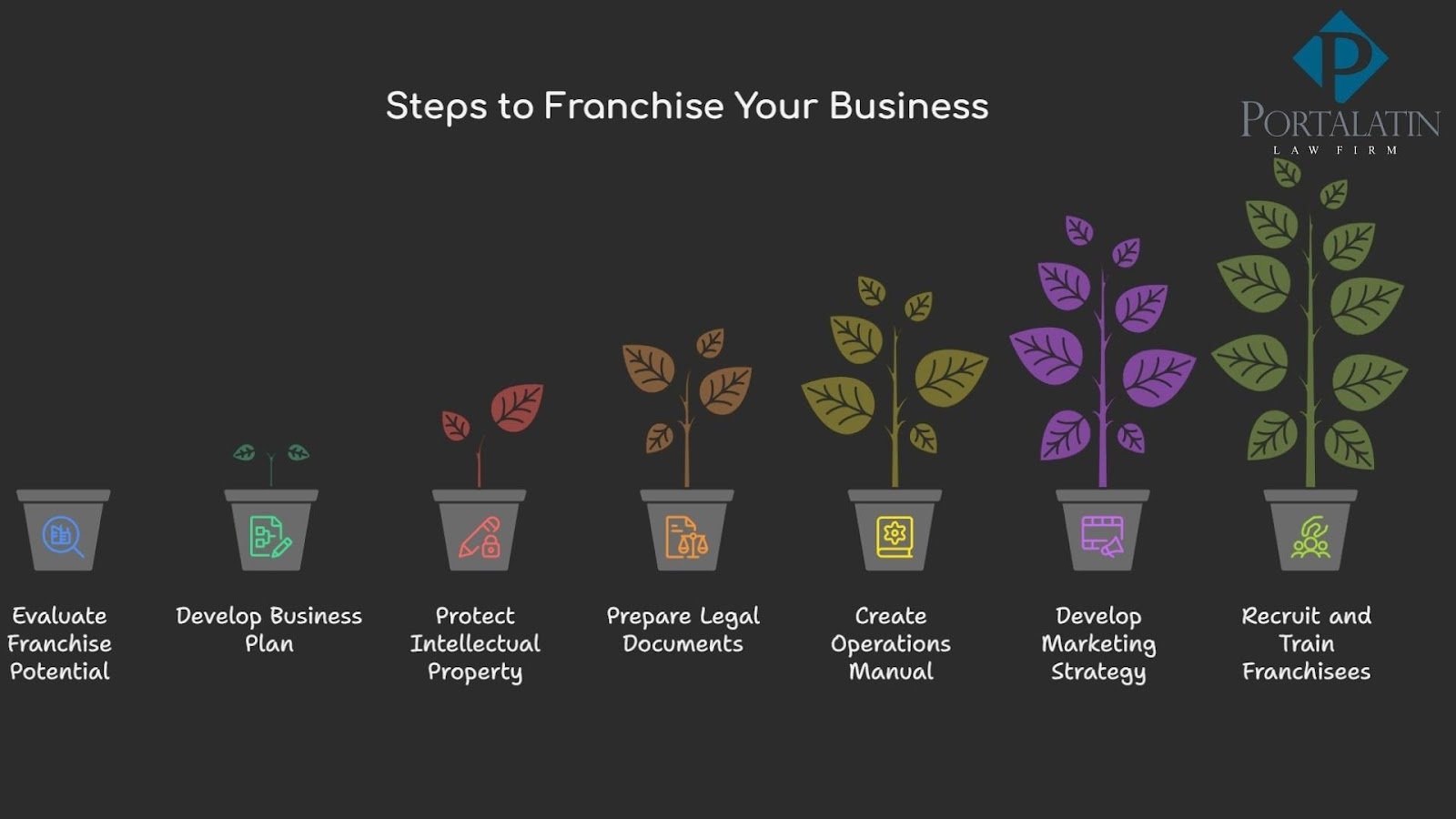Franchising is a powerful way for small businesses to scale without taking on the full cost of expansion. It allows business owners to license their brand, business model, and processes to independent operators (franchisees).
According to Forbes, there were approximately 805,500 franchise establishments in the U.S. in 2023, employing nearly 8.7 million people. With a total economic output projected to reach $860 billion, franchising plays a major role in small business expansion and job creation.
Portalatin Business Law Firm helps entrepreneurs franchise the right way, securing trademarks, drafting strong contracts, and aligning legal strategy with business goals. With experience in helping international clients, we offer trilingual services in English, Spanish, and Portuguese, making the franchising process smooth.
Key Takeaways
- Franchising allows fast growth without the upfront costs of opening new locations yourself.
- Legal documents like the FDD and a franchise agreement are important for compliance and clarity.
- Trademark and IP protection keep your brand consistent and secure across all locations.
- A business lawyer makes sure you meet legal requirements and set up a strong foundation for success.
What is Franchising and How Does It Benefit Small Businesses?
Franchising is a method where a business owner (franchisor) grants another party (franchisee) the right to operate under their brand, using their business model and processes. In return, the franchisee typically pays fees and agrees to follow established guidelines.
Benefits of Franchising for Small Businesses
- Rapid Expansion: Franchising allows businesses to grow quickly without the need for significant capital investment from the original owner.
- Brand Recognition: As more franchise locations open, brand visibility increases, attracting a broader customer base.
- Shared Resources: Franchisees often benefit from collective purchasing power, reducing costs for supplies and marketing.
- Motivated Management: Franchisees have a vested interest in the success of their location, leading to dedicated management and operations.
Potential Challenges
- Consistency Maintenance: Making sure all franchisees adhere to brand standards can be challenging, potentially affecting overall reputation.
- Control Limitations: Franchisors may have limited control over daily operations of franchisees, impacting uniformity.
- Initial Setup Costs: Developing a franchising system requires an initial investment in legal, training, and operational support structures.
What Legal Documents Are Required to Franchise a Business?
Legal compliance is one of the most important aspects of franchising. 15 U.S. states have specific franchise laws, often requiring franchise registration before sales can begin. A business lawyer makes sure your documents meet federal and state regulations, preventing costly legal issues.
Here are the key legal documents required to franchise your business.
Franchise Disclosure Document (FDD)
The cornerstone of franchising in the United States is the Franchise Disclosure Document (FDD). This comprehensive document provides prospective franchisees with information about the franchisor and the franchise system, enabling informed decision-making. The FDD encompasses 23 specific items, including:
- Franchisor Details: Background information about the franchisor and its key personnel.
- Litigation History: Any past or current legal actions involving the franchisor.
- Initial Fees: A breakdown of all initial costs required to start the franchise.
- Financial Performance Representations: Information on potential earnings, if the franchisor chooses to provide it.
By law, franchisors must furnish the FDD to prospective franchisees at least 14 days before any contract signing or payment, allowing ample time for review.
Franchise Agreement
The franchise agreement is the binding contract between the franchisor and franchisee, outlining the rights and obligations of both parties. Key components typically include:
- Grant of Franchise: Details the rights granted to the franchisee, such as the use of trademarks and operating systems.
- Duration and Renewal Terms: Specifies the length of the agreement and conditions for renewal.
- Fees and Payments: Clarifies all financial obligations, including initial fees, royalties, and advertising contributions.
- Territorial Rights: Defines any exclusive territories granted to the franchisee.
- Training and Support: Outlines the training programs and ongoing support provided by the franchisor.
This agreement serves as the foundation of the franchisor-franchisee relationship, detailing operational expectations and standards.
Intellectual Property Protection
Protecting the brand’s intellectual property is vital in franchising. Steps include:
- Trademark Registration: Allows for legal protection of the brand’s name, logo, and other identifying marks.
- Copyrights and Patents: Protects proprietary materials, such as training manuals or unique product formulations.
Proper intellectual property protection prevents unauthorized use and maintains brand integrity across all franchise locations.
7 Steps to Franchise Your Small Business

Franchising your small business can be a powerful way to expand your brand and reach new markets. Here’s a step-by-step guide to help you understand the process:
1. Evaluate Your Business’s Franchise Potential
Assess whether your business model is replicable and has a track record of profitability. A strong brand identity and consistent operations are key indicators of franchisability.
2. Develop a Comprehensive Franchise Business Plan
Create a detailed plan outlining your franchise strategy, including market analysis, financial projections, and support structures for franchisees. This plan will serve as a roadmap for your franchising journey.
3. Protect Your Intellectual Property
Make sure your trademarks, logos, and proprietary processes are legally protected. This protects your brand and provides franchisees with a clear framework to operate within.
4. Prepare Legal Documents
Prepare legal documents, such as the Franchise Disclosure Document (FDD) and franchise agreements, to outline the rights and responsibilities of both parties. Consulting with a franchise attorney is advisable to confirm compliance with federal and state regulations.
5. Create an Operations Manual
Develop a comprehensive operations manual detailing every aspect of running the franchise, from daily operations to marketing strategies. This allows for consistency across all locations.
6. Develop a Franchise Marketing Strategy
Create a marketing plan to attract potential franchisees. Show the benefits of joining your franchise system and outline the support and training provided.
7. Recruit and Train Franchisees
Implement a thorough selection process to identify franchisees who align with your brand values. Provide comprehensive training to make sure they can replicate your business model effectively.
What Makes Starting a Franchise in Florida Unique?
Florida is one of the top states for franchising, offering a business-friendly legal environment and a diverse market. Unlike some states, Florida does not have additional franchise registration requirements beyond federal regulations, simplifying the process for business owners.
Here’s what sets the state apart:
Franchise-Friendly Legal Framework
Florida’s legal system is generally supportive of franchising, providing clarity and protection for both franchisors and franchisees. Notably, the state does not impose additional franchise-specific registration requirements beyond federal regulations, simplifying the process for businesses aiming to expand through franchising.
Support for Small Businesses
The Florida Small Business Development Center (SBDC) Network plays a pivotal role in assisting entrepreneurs. With over 40 offices statewide, the SBDC offers tools, training, and resources tailored to small businesses, including those interested in franchising.
This extensive support network can be instrumental in guiding business owners through the intricacies of starting and managing a franchise.
Economic Development Initiatives
Organizations like SelectFlorida, formerly known as Enterprise Florida, are dedicated to fostering economic growth. As a public-private partnership, SelectFlorida collaborates with business and government leaders to create a conducive environment for business expansion, including franchising.
Their efforts contribute to a vibrant economic landscape that encourages entrepreneurial ventures.
Diverse and Growing Market
Florida’s diverse population and status as a top tourist destination provide a broad customer base for various franchise models. This diversity enables franchisors to tap into multiple market segments, increasing the potential for business success across different industries.
Why Do You Need a Business Lawyer When Franchising Your Small Business?

Franchising your business involves complicated legal requirements. A business lawyer can help you understand these effectively.
Understanding Legal Requirements
Franchising is regulated by the Federal Trade Commission’s Franchise Rule, which mandates providing a Franchise Disclosure Document (FDD) to potential franchisees. A lawyer makes sure your FDD complies with these regulations.
Drafting Franchise Agreements
The franchise agreement outlines the terms between you and your franchisees. An attorney drafts this document to protect your interests.
Protecting Intellectual Property
Your brand’s trademarks and proprietary information are valuable. A lawyer helps secure these assets, maintaining your brand’s integrity.
Involving a business lawyer in your franchising process protects your business and sets the foundation for successful expansion.
Protect Your Brand and Franchise with Confidence
Franchising is a big step, but the right legal foundation makes all the difference. At Portalatin Business Law Firm, we help entrepreneurs expand without risking their brand or business integrity. With knowledge in business law, trademarks, and international clients, we make sure your franchise is built to last.
Don’t leave your business vulnerable, get the legal support you need today. Schedule a consultation now and take the next step toward a secure and successful franchise.


